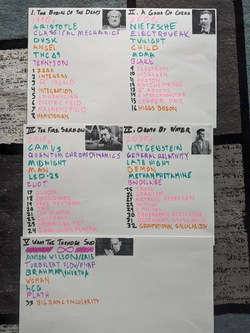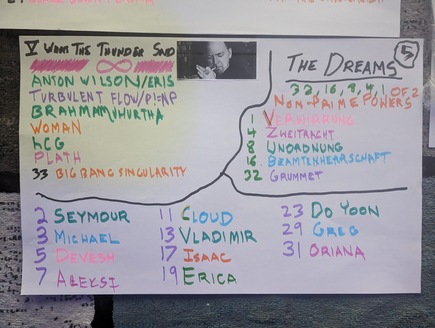In my hubris, I consciously used James Joyce’s Ulysses as a model, as it in turn used Homer’s Ὀδύσσεια. Originally, I had a schema mapping each chapter to a particle, and each part to a philosopher, a stage of human development, a poet, a physical theory, a stage of the evening, a drug, and a decade. The parts were named after the five parts of Eliot’s The Waste Land. All of this went almost immediately out the window; if you know of a good way to thematically center a chapter around the τ (tau lepton), I’m all ears. My longest chapter, "a stamped-in network of paths", was an homage to (and justified by) the "Scylla and Charybdis" chapter of Ulysses (the title itself is a reference to Heart of Darkness). My last chapter is of course a vastly inferior inversion of "Penelope". Bolaño’s name was taken from the Chilean Roberto Bolaño Ávalos, whose 2666 and Los detectives salvajes are masterpieces.
Whenever it seemed reasonable to supply the foreign word or phrase, I did, because other languages are fun. I always provided a translation because untranslated phrases are maddening. All Scriptural quotes use the Latin of St. Jerome’s Vulgate; I chose translations on a verse-by-verse basis according to aesthetics. Where I found no translation suitable, I provided my own. KJV: King James Version, 1769 Cambridge edition. NIV: New International Version, 1984 revision (not 2011). NLT: New Living Translation, 1996.

I had originally planned for 33 chapters across five parts. It turned out being 29 chapters, plus an epilogue. The five parts were retained. They’re taken directly from Robert Anton Wilson’s Illuminatus! trilogy, where they’re described as the five stages of the Illuminati’s cyclic theory of history. These are themselves an extension from the three-part system of Joachim of Floris and the four-part system of Giambattista Vico; interested readers ought consult that fascinating book, especially its Appendix ג, "The Illuminati Theory of History".
I planned to have characters introduced in chapters which were prime numbers. I’d then only use characters when present in a chapter’s prime factorization. This wasn’t the least workable idea I’ve ever had (aside from the fact that you have no characters available for Chapter 1), but it was pointless and autistic, and I rejected it early on. In addition, dreams were originally going to be a much more major theme of the book, with powers of two ("dream chapters") intended to be entirely dream records. This immediately introduced a problem: both Chapter 1 and Chapter 2 are dream chapters; this can be worked around by saying each non prime power of two. As the book grew, less room for dreams emerged, and the entire concept was abandoned (it lives on in a much reduced form in Roosevelt and Foster’s exchanges in Chapter 1).

The character of Harold Grimbisch is loosely inspired by Timothy Scully, of whom I can’t speak highly enough. It was my pleasure to correspond with Dr. Scully, and to benefit from his research and experience. Now in his seventies, Dr. Scully seems still to be in fine fettle, and I wish him the very best. I directly appropriated William Leonard Pickard, Jr., but think I portrayed him fairly based on Operation White Rabbit and The Rose of Paracelsus. His interactions with Grimbisch and the SYNCOPE cartel are entirely my invention.
Nowhere did I pull scientific punches. While I do not recommend midnight’s simulacra as a primary source for science, there was none of this "we changed a few details" business as claimed by e.g. the writers of Breaking Bad, nor Tom Clancy in his Afterword to The Sum of All Fears. Outdoing Clancy’s exposition regarding a thermonuclear detonation was absolutely a goal of mine, one I believe I achieved.
Venda Čermák in all her lack of chill is, like, the antithesis of Jeanette Martin, my academic bowl coach at Walton. Jeanette ran one practice a week, is merry and has never barked at anyone, thought teams that wore uniforms were lame, and generally refused and loathed any kind of strict regimentation. The paramilitary atmosphere of Čermák’s system would have been anathema to her. Like Pete Caroll at USC, Martin didn’t need that kind of crap to win national championships, of which she has three.
I had a hard limit of six months to write this, my first novel. It really shows at the end =\. The saga of Devesh and his solar turtle was going to be developed much further. In the end I would have removed it except that I needed the revelations of Nemesis to set up God’s commentary from Heaven (which I consider the book’s thematic climax, and was one of the first things I wrote). I hope you liked reading Devesh as much as I enjoyed writing him. There was supposed to be a whole section of Katz and Bolaño cat-and-mousing one another. Oh well, the book is already long enough. There will be more of that kind of thing in my next novel.
The book as a whole can be read as a response to Camus’s The Myth of Sisyphus, which I consider easily the most sublime and convincing philosophical work of the twentieth century. It is furthermore a result of my investigation of and fascination with cancer, following my father’s early death by leukemia (almost certainly a result of tritium leakage at the Savannah River Plant).
I don’t want to spoil anything, but actions taken by Oriana at the book’s close are erroneous actions made due to incomplete information. Tension between Katz and Oriana arises primarily from the former’s hands-off moral relativism contra the latter’s action-oriented moral clarity. Her actions are justified and possibly even correct within her incomplete knowledge. If Katz had been more open and forthright, her knowledge would have been more complete. Lawful goods pair messily with chaotic neutrals. No blame. Her timing furthermore corresponds to my 2013-05 raid by the DEA, from which you may draw your own conclusions.
The book clearly admits sequela, though that would feel cheap. I do fully intend to use these characters and their history in an expanded world, but only peripherally. Though who knows?
To what degree is Sherman Spartacus Katz autobiographical?
Don’t worry your pretty little head about it, baybee.
Ain’t your concern.
—nick 2024-02